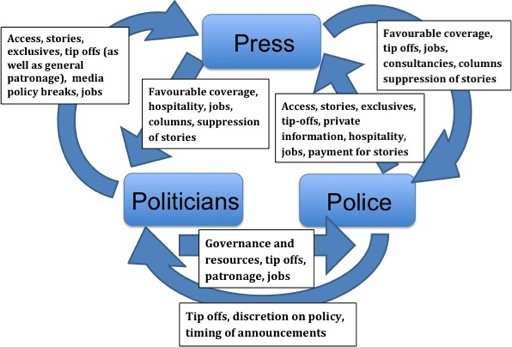One of the problems with the Leveson Inquiry is that it’s too bloody interesting. I’ve had to switch off the live webcast because otherwise I’d never get any work done.
I can do that with a clear conscience because Damien Tambini and his LSE colleagues are in there every day, monitoring what’s going on and reflecting on it. Today, Damien has a really useful round-up of Module 2 of the Inquiry. This graphic is taken from his post, and summarises the cosy ecosystem that Leveson has been probing over the second ‘module’ of his investigation. The points he highlights are:
Numerous witnesses of the police have supported Sue Akers’ claim that a culture of illegal payments to police in return for stories and other information has persisted at the Met and other forces. Many journalists see this as normal practice and police officers both at the met and at various regional forces agreed that it was widespread.
Individual journalists are alleged to receive various favours from the police: stories and access, but also tip offs for example if a prisoner is to be released, or if police have been notified of celebrity movements.
News International has been alleged to operate a system of payments for stories that include frequent and significant payments to police.
There have been numerous separate allegations that police inquiries were curtailed, promoted or in some way affected due to the complex of reciprocities resulting from various forms of media favours. In particular: the investigation of phone hacking itself.

